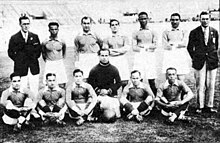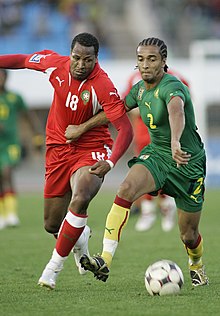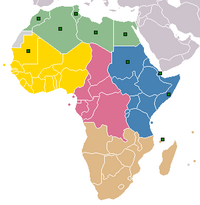Portal:Football in Africa
Introduction
Football is the most popular sport in Africa. Indeed, football is probably the most popular sport in every African country, although rugby and cricket are also very popular in South Africa. (Full article...)
This section may be unbalanced towards certain viewpoints. (October 2022) |

Selected article -

The Union of North African Football (UNAF; Arabic: اتحاد شمال إفريقيا لكرة القدم, romanized: Ittiḥād Shamāl Ifrīqyā li-Kurat al-Qadam; French: Union nord-africaine de football) is an association football organising body. It was launched in 2005 by the North African members of the Confederation of African Football (CAF), Algeria, Egypt, Libya, Morocco and Tunisia. The post of president will be rotated among the five founding nations.
Selected biography -
Gyan began his career in 2003 with Ghanaian Premier League club Liberty Professionals scoring a prolific ten goals in sixteen matches then spent three seasons with Serie A club Udinese via two seasons loan at Modena netting on fifteen occasions in fifty-three league matches and at Udinese where he scored eleven times in thirty-nine league matches. In 2008, Gyan joined Ligue 1 club Rennes, netting fourteen times in forty-eight league matches during two seasons. In 2010, Gyan joined Premier League club Sunderland, breaking the club's transfer record and netting on ten occasions in thirty-four Premier League matches during two seasons. In 2011, Gyan joined Al Ain of the UAE Pro-League on loan and become the league's top-goalscorer, scoring twenty-four times in twenty-seven matches. In the following season, Gyan permanently joined Al Ain and once again became the league's top-goalscorer while he helped Al Ain retain the UAE Pro-League title, scoring an impressive twenty-eight goals in thirty-two matches. In the 2013–14 season, Gyan prolifically scored on forty-four occasions in forty matches with Al Ain.
Gyan is the all-time leading goalscorer of the Ghana national team. He represented his nation at the 2006 World Cup scoring the fastest goal of the tournament after 68 seconds, 2010 and 2014 FIFA World Cups, scoring three goals in 2010, and also missing a crucial penalty kick in the last minute of extra-time in a quarter-final defeat at the hands of Uruguay. In 2014, at the 2014 World Cup Gyan became the top African goalscorer in the history of the World Cup.
Selected image -
 |
Australian Footballers in Durban South Africa, 1900
Subcategories
Related portals
More sports portals
WikiProjects
Related task forces and sub-projects
African football task force
WikiProject Africa • WikiProject Football
WikiProject Football task forces and sub-projects
 | |
| Wikipedia ads | file info – #250 |
Topics
Open tasks

- Expand stubs: Competitions in Africa • Organizations
- Expand club articles of teams from Africa.
- Expand biographies of Africans involved in football.
- Create: Requested articles • Most wanted football articles • Requested general football articles
- Add: Infoboxes • Images (General requests, Requested images of people)
- Review: articles currently under review
- Assess: Assessment requests • Assess an article
- Revert vandalism on this portal and on African football articles
- Assist in maintaining this portal and keeping its selected content up to date.
- WikiNews: Create and submit news stories about African football for Wikipedia's sister project WikiNews.
Associated Wikimedia
The following Wikimedia Foundation sister projects provide more on this subject:
-
Commons
Free media repository -
Wikibooks
Free textbooks and manuals -
Wikidata
Free knowledge base -
Wikinews
Free-content news -
Wikiquote
Collection of quotations -
Wikisource
Free-content library -
Wikiversity
Free learning tools -
Wiktionary
Dictionary and thesaurus
More portals
Sources

- ^ "The History Of Soccer In Africa". NPR.org. 2010-06-09. Retrieved 2016-03-31.
- ^ a b c Alegi, Peter (2010). African Soccerscapes. Ohio University Press. pp. 1–2. ISBN 9780896802780.
- ^ Frimpong, Enoch Darfah. "Ghana news: A world of superstition, frustration and disillusionment - Graphic Online". Retrieved 23 September 2017.
- ^ Lacey, Marc (8 August 2002). "Kangemi Journal; For Spellbinding Soccer, the Juju Man's on the Ball". The New York Times. NY Times. Retrieved 2016-03-31.
- ^ "World Cup Witchcraft: Africa Teams Turn to Magic for Aid". National Geographic. Archived from the original on July 10, 2006. Retrieved 2016-03-31.
- ^ Andy Mitten (September 2010). The Rough Guide to Cult Football. Rough Guides UK. ISBN 9781405387965. Retrieved 2016-04-02.
- ^ "African Nations Cup overshadowed by hocus pocus | Football". The Guardian. Retrieved 2016-04-09.
- ^ Kuper, Simon (2006). Soccer Against the Enemy: How the World's Most Popular Sport Starts and Stops Wars, Fuels Revolutions, and Keeps Dictators in Power. Nation Books. p. 123. ISBN 978-1-56025-878-0.

























